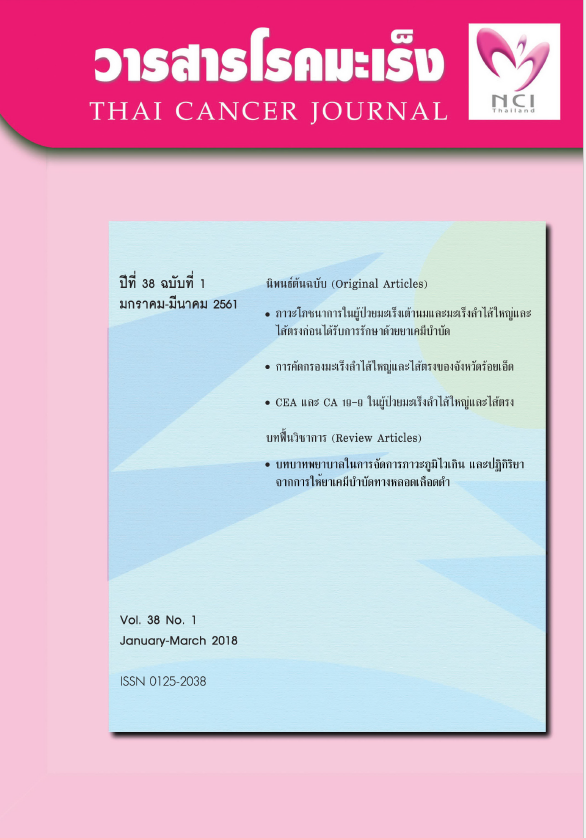CEA and CA19-9 in Patients with Colorectal Cancer
Keywords:
serum tumor marker, CEA, CA 19-9, colorectal cancerAbstract
Colorectal cancer is the most common cause of death in Thailand. The early diagnosis of colon and rectal cancers is important because it can increase the chances of cure and survival rates for patients. For laboratory testing, the detection of tumor markers in clinical samples can be used for diagnosis, prognosis, and monitoring treatment outcomes. This study aimed to evaluate the efficacy of carcinoembryonic antigen (CEA) and carbohydrate antigen 19-9 (CA19-9) in differentiating patients with colorectal cancer from benign colon tumors, and to evaluate the relationship of CEA and CA19-9 cancer markers with various pathological parameters among colorectal-cancer patients. The 105 patients and 22 benign colon tumors treated at the National Cancer Institute were detected for CEA and CA19-9. It was found that CEA levels among patients with colorectal cancer were higher than those with benign tumors (P=0.006), while CA19-9 level did not differ significantly between the two groups (P=0.116). In addition, the sensitivity of using CEA and CA19-9 parameters to differentiate patients with colorectal cancer from benign colon tumors were 56.19 % and 26.67 %, respectively. The sensitivity of combined detection using CEA and CA19-9 was higher than either marker alone (60.00%). The present study showed that CEA can better discriminate between patients with colorectal cancer and benign colon tumors than CA19-9 (the areas under the ROC curve (AUC) were 0.70 and 0.61 for CEA and CA19-9, respectively). CEA and CA19-9 serum concentrations were also significantly higher in stage IV disease than stage I-III, and significantly elevated in the presence of distant metastasis (P=0.000), but the levels of both tumor markers were not significantly associated with tumor localization and lymph-node metastasis.
References
American Cancer Society (2013): Cancer Facts and Figures. Available at: http://globocan.iarc.fr/.Accessed March 20, 2017.
Imsamran W, Chaiwerawattana A, Wiangnon S, Pongnikorn D, Sangrajrang S, Suwanrungrung K, Buasom R. Cancer in Thailand 8 theds 2010-2012, Bangkok: New Thammada Press (Thailand) Co., Ltd; 2015.
สถาบันมะเร็งแห่งชาติ กรมการแพทย์ กระทรวงสาธารณสุข. ทะเบียนมะเร็งระดับโรงพยาบาล พ.ศ.2557 Hospital-Based Cancer Registry Annual Report 2014. กรุงเทพมหานคร: โรงพิมพ์ตะวันออก; 2559.
Watson AJ, Collins PD. Colon cancer: a civilization disorder. Dig Dis 2011;29:222-8.
Jawad N, Direkze N, Leedham SJ. Inflammatory bowel disease and colon cancer. Recent Results Cancer Res 2011;185:99-115.
Mork ME, You YN, Ying J, Bannon SA, Lynch PM, Rodriguez-Bigas MA, et al. High Prevalence of Hereditary Cancer Syndromes in Adolescents and Young Adults With Colorectal Cancer. J Clin Oncol 2015;33:3544-9.
O'Connell JB, Maggard MA, Ko CY. Coloncancer survival rates withthenew AmericanJoint Committeeon Cancer sixth edition staging. J Natl Cancer Inst 2004;96:1420-5.
Cunningham D, Atkin W, Lenz HJ, Lynch HT, Minsky B, Nordlinger B, Starling N. Colorectal cancer. Lancet 2010;375:1030-47.
Mattar R, Alves de Andrade C, DiFavero G, Gama-Rodrigues J, Laudanna A. Preoperative serum levels of CA 72-4, CEA, CA 19-9, and alphafeto- protein in patients with gastric cancer. Rev Hosp Clin Fac Med Sao Paulo 2002;57:89-92.
Carpelan-Holmstrom M, Louhimo J, Stenman U. CEA, CA19-9 and CA72-4 improve the diagnostic accuracy in gastrointestinal cancers. Anticancer Res 2002;22:2311-16.
Chen C, Yang S, Lin J, Lin T, Chen W, Jiang J, et al. Is it reasonable to add preoperative serum level of CEA and CA19-9 to staging for colorectal cancer? J Surg Res 2005;124:169-74.
Locker GY, Hamilton S, Harris J, Jessup JM, Kemeny N, Macdonald JS, et al. ASCO 2006 update of recommendation for use of tumor markers in gastrointestinal cancer. J Clin Oncol 2006;24:5313-27.
Yang X, Chen C, Peng C, Liu S, Li Y. Carbohydrate antigen 242 highly consists with carbohydrate antigen 19-9 in diagnosis and prognosis of colorectal cancer: study on 185 cases. Med Oncol 2012;29: 1030-6.
Goldberg EM, Simunovic LM, Drake SL, Mueller WF Jr, Verrill HL. Comparison of serum ca 19-9 and cea levels in a population at high risk for colorectal cancer. Hybridoma 1989;8:569-75.
Polat E, Duman U, Duman M, Atici A.E, Reyhan E, Dalgic T, et al. Diagnostic value of preoperative serum carcinoembryonic antigen and carbohydrate antigen 19-9 in colorectal cancer. Curr Oncol 2014; 21:1-7.
Eman M. I. Youssef, Gehan H. Ewieda, Haneya A. A. Ali, Amany M. Tawfik, Wafaa Mohi El-deen Abd Elfatah, Amgad A. Ezzat, et al. Comparison between CEA, CA 19-9 and CA 72-4 in Patients with Colon Cancer. International Journal of Tumor Therapy 2013;2:26-34.
Reiter W, Stieber P, Reuter C, Nagel D, Lau-Werner U, Lamerz R. Multivariate analysis of the prognostic value of cea and ca 19-9 serum levels in colorectal cancer. Anticancer Res 2000;20:5195-8.
Wang F, Tsai L, Chang Z, Han S and Tsao D. The significance of CA19-9 tumor antigen in the serum of patients with carcinomas. Proc Natl Sci Counc Repub China B 1985;9:119-25.
Zhang SY, Lin M, Zhang HB. Diagnostic value of carcinoembryonic antigen and carcinoma antigen 19-9 for colorectal carcinoma. Int J Clin Exp Pathol 2015;8:9404-9.
Wild N, Andres H, Rollinger W, Krause F, Dilba P, Tacke M, et al. A combination of serum markers for the early detection of colorectal cancer. Clin Cancer Res 2010;16:6111-21.
Ochiai H, Ohishi T, Osumi K, Tokuyama J, Urakami H, Seki S et al. Reevaluation of serum p53 antibody as a tumor marker in colorectal cancer patients. Surg Today 2012;42:164-8.
Vukobrat-Bijedic Z, Husic-Selimovic A, Sofic A, Bijedic N, Bjelogrlic I, Gogov B, et al. Cancer Antigens (CEA and CA 19-9) as Markers of Advanced Stage of Colorectal Carcinoma. Med Arch 2013;67:397-401.
Downloads
Published
Issue
Section
License
บทความทีตีพิมพ์ในวารสารโรคมะเร็งนี้ถือว่าเป็นลิขสิทธิ์ของมูลนิธิสถาบันมะเร็งแห่งชาติ และผลงานวิชาการหรือวิจัยของคณะผู้เขียน ไม่ใช่ความคิดเห็นของบรรณาธิการหรือผู้จัดทํา







